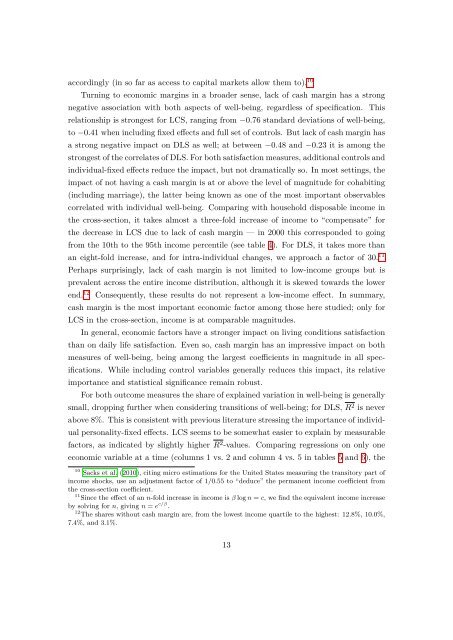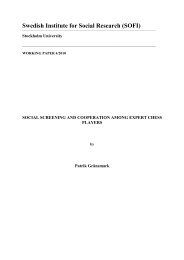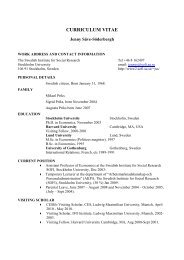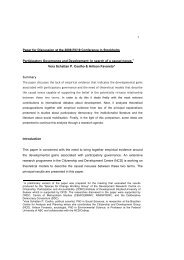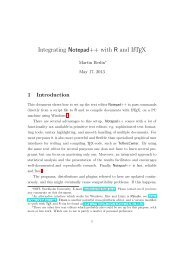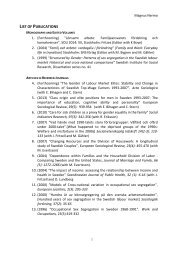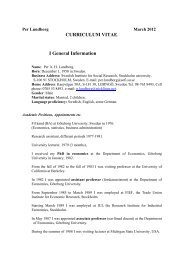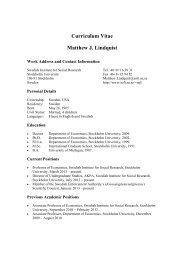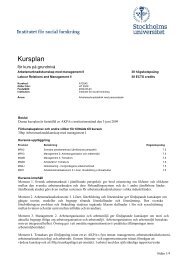Subjective Well-Being, Income and Economic Margins - DiVA
Subjective Well-Being, Income and Economic Margins - DiVA
Subjective Well-Being, Income and Economic Margins - DiVA
You also want an ePaper? Increase the reach of your titles
YUMPU automatically turns print PDFs into web optimized ePapers that Google loves.
accordingly (in so far as access to capital markets allow them to). 10<br />
Turning to economic margins in a broader sense, lack of cash margin has a strong<br />
negative association with both aspects of well-being, regardless of specification. This<br />
relationship is strongest for LCS, ranging from −0.76 st<strong>and</strong>ard deviations of well-being,<br />
to −0.41 when including fixed effects <strong>and</strong> full set of controls. But lack of cash margin has<br />
a strong negative impact on DLS as well; at between −0.48 <strong>and</strong> −0.23 it is among the<br />
strongest of the correlates of DLS. For both satisfaction measures, additional controls <strong>and</strong><br />
individual-fixed effects reduce the impact, but not dramatically so. In most settings, the<br />
impact of not having a cash margin is at or above the level of magnitude for cohabiting<br />
(including marriage), the latter being known as one of the most important observables<br />
correlated with individual well-being. Comparing with household disposable income in<br />
the cross-section, it takes almost a three-fold increase of income to “compensate” for<br />
the decrease in LCS due to lack of cash margin — in 2000 this corresponded to going<br />
from the 10th to the 95th income percentile (see table 4). For DLS, it takes more than<br />
an eight-fold increase, <strong>and</strong> for intra-individual changes, we approach a factor of 30. 11<br />
Perhaps surprisingly, lack of cash margin is not limited to low-income groups but is<br />
prevalent across the entire income distribution, although it is skewed towards the lower<br />
end. 12<br />
Consequently, these results do not represent a low-income effect. In summary,<br />
cash margin is the most important economic factor among those here studied; only for<br />
LCS in the cross-section, income is at comparable magnitudes.<br />
In general, economic factors have a stronger impact on living conditions satisfaction<br />
than on daily life satisfaction. Even so, cash margin has an impressive impact on both<br />
measures of well-being, being among the largest coefficients in magnitude in all specifications.<br />
While including control variables generally reduces this impact, its relative<br />
importance <strong>and</strong> statistical significance remain robust.<br />
For both outcome measures the share of explained variation in well-being is generally<br />
small, dropping further when considering transitions of well-being; for DLS, R 2 is never<br />
above 8%. This is consistent with previous literature stressing the importance of individual<br />
personality-fixed effects. LCS seems to be somewhat easier to explain by measurable<br />
factors, as indicated by slightly higher R 2 -values. Comparing regressions on only one<br />
economic variable at a time (columns 1 vs. 2 <strong>and</strong> column 4 vs. 5 in tables 5 <strong>and</strong> 6), the<br />
10 Sacks et al. (2010), citing micro estimations for the United States measuring the transitory part of<br />
income shocks, use an adjustment factor of 1/0.55 to “deduce” the permanent income coefficient from<br />
the cross-section coefficient.<br />
11 Since the effect of an n-fold increase in income is β log n = c, we find the equivalent income increase<br />
by solving for n, giving n = e c/β .<br />
12 The shares without cash margin are, from the lowest income quartile to the highest: 12.8%, 10.0%,<br />
7.4%, <strong>and</strong> 3.1%.<br />
13


